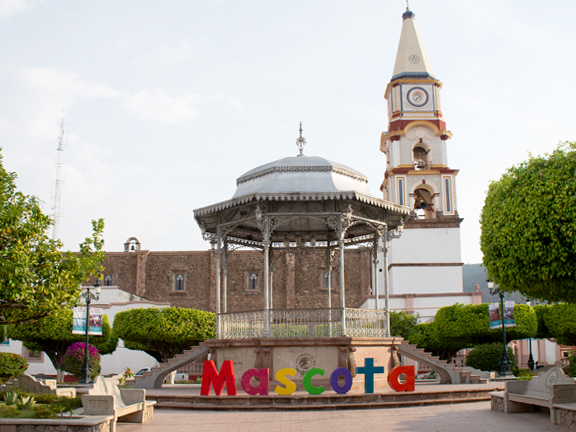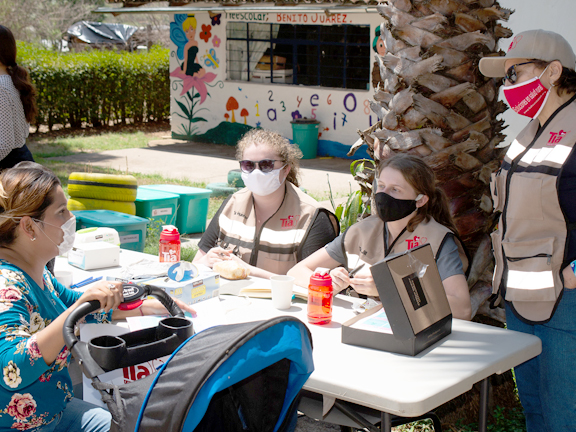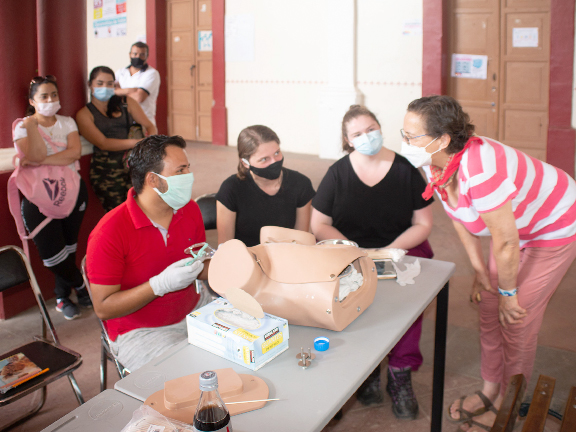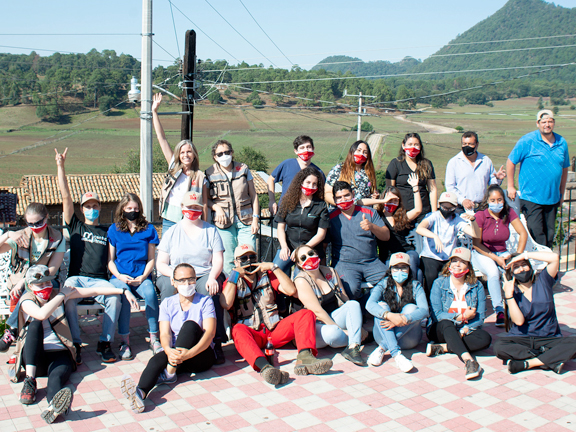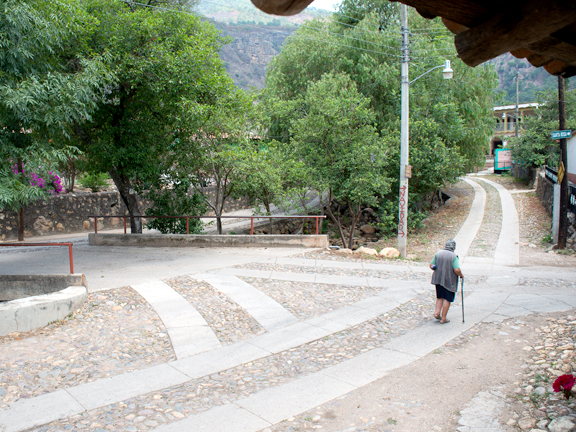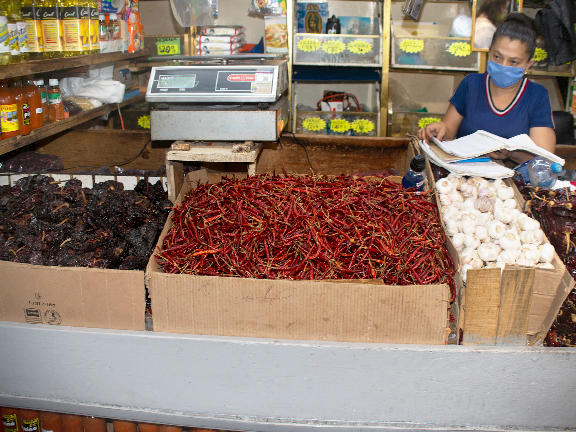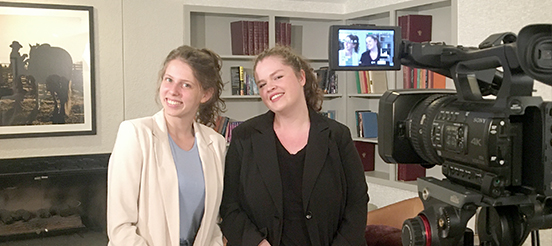The first international working field project for CCAP Across The Map took place in Jalisco, Mexico.
This will be the first of many field projects for our organization.
Mexico, June 14th-22nd, 2020
In Partnership With
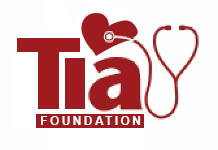
Using a “teach them to fish” model, the Tia Foundation trains and equips community health workers to respond to emergencies and provide basic preventative care in remote communities of rural Mexico, where there are no doctors.
Project Mission
CCAP Across The Map, the Tia Foundation, and Volunteer Expedition Adventurers (VEAs) are partnering to address healthcare needs in areas surrounding the municipality Mascota in Jalisco, Mexico whose healthcare system is predominantly “Promotoras”, also known as community health care workers. The Tia Foundation and VEAs will be training these healthcare workers on basic medical procedures, such as taking vitals. CCAP Across The Map will be providing educational seminars on cervical cancer prevention through HPV vaccination and training these workers to diagnose cervical cancer using a method called visual inspection using acetic acid (VIA). CCAP Across The Map will additionally be donating the medical equipment necessary for the VIA procedure to these communities. Lastly, CCAP Across The Map will be providing community consultations in different mountainous villages to educate the community about the importance of HPV vaccination for cervical cancer prevention. The goal is to equip local, rural communities, with the knowledge of cost effective and sustainable methods of preventing and diagnosing cervical cancer.
Results of the Trip
Day One Report:
On day one, Co-Founders Hunter Ackerley and Jillian Leaver met with the Volunteer Expedition Adventurer’s, Wynona Heim and her daughter Rhiannon Heim, as well as Tia Foundation Founder Laura Libman and her son, the marketing director, Nate Harris. We were driven around by Elias during the entire trip. Day one, we settled into a hotel for the night in Guadalajara and prepared for a busy week ahead.
Day Two Report:
On day two, everyone was up early in the morning and we met the medical brigade volunteers from Guadalajara outside of the hotel for the first time. We also met our translator, Susy Zavala, and paid her for her services. Then we made the three hour journey from Guadalajara to the first small town outside of Mascota where the entire team set up a pop-up health clinic. We gave out eleven HPV infographics that day to a variety of women and men who had different amounts of knowledge about the HPV vaccination and its free availability for girls ages 9-12 in Mexico.

At around 4pm that day after we had returned to Mascota from the small surrounding town, we attended a lecture about vital signs conducted by Dr. Roberto Martinez and when the community health workers (called Promotoras) began to learn how to take these vitals, we spoke with our translator and the assistant to the President of Mascota about setting up two meetings, one with the Director of Health, Dra. Ada Hernandez, and another with the President, Dra. Sara Castillon Ochoa.
Day Three Report:
On day three, we went with our translator Susy to the meeting with Dra. Ada Hernandez, Director of Health, at the main hospital in Mascota and had a two hour meeting where we learned a few important things about HPV and cervical cancer in the greater area of Jalisco, Mexico. These things include:
1) Access to the HPV vaccine is free for ONLY girls ages 9-12 in Mexico, and these vaccines are often distributed through schools. However, many children who live in more poor areas may miss this opportunity due to a lack of accessibility. The community healthcare workers often go door-to-door in an attempt to vaccinate girls who may not get vaccinated in school.
2) Pap smear test results through the hospital take about two months to get back to the patient.
3) Mobile Vans come to do rapid HPV tests twice a year, but these results still take one month to get back to the patient.
4) Patients who need further health care due to a positive result have to travel to a bigger city, either Guadalajara or Puerto Vallarta, for FREE treatment. However, traveling these long distances and being away for a longer period of time is often too much of a financial strain on families so patients are often not able to do it.
5) Medical professionals, including the community healthcare workers, have difficulty reaching people in poorer smaller surrounding towns because the medical center does not have enough resources to transport these people to the regions that need help.
Later that day, at around 4pm, we, along with the guidance of two doctors from the brigade, taught three hour-long lectures to the community healthcare workers (groups of 7-8) in Spanish about HPV and the VIA method for diagnosis to a total of 23 people. We administered pre and post tests about both topics to each Promotora and we saw an average increase in knowledge by about 20% for HPV and about 40% for the VIA diagnostic method.
Day Four Report:
On day four, we went with our translator, Susy, again to have a meeting with the President of Mascota, Dra. Sara Castillin Ochoa. This meeting was around an hour and a half and we learned more about the nature of HPV and cervical cancer in Mascota. The things we learned include:
1) The President believes there is a low rate of HPV and cervical cancer in the current younger generation of Mascota. However, many people do not get tested so the number of who actually has HPV and potentially cervical cancer is unclear.
2) The President herself has educational lectures about HPV and practicing safe sex with the youth in Mascota, however, due to the small town nature and closeness of the people in the town, the younger children may not feel comfortable buying condoms or the like to practice safe sex due to fear of people finding out they are sexually active.
3) The President created a group called IMAJ, which is a youth centered program for social prevention of health problems like HPV. She is working on getting more workshops through this group and plans on continuing to dedicate time to running this group after her term as President is over.
4) The President has a strong connection with parents through the schools and knows that some parents want to buy the HPV vaccine for their boys and older girls but do not have a trusted contact to buy it from.
5) Boys do not get the vaccine, in fact the President did not know that they could based on current medical guidelines.
6) The President tries to travel frequently to many areas of Mascota and connect with the youth about health education, especially since many children will have been sexually active by the time they turn 12.
7) The vaccine is no longer offered for free after girls turn twelve because of a belief that they have likely already been sexually active and exposed to HPV already.
Later that day, around 4pm, we directed a skills lab to train the 23 promotoras how to do the VIA test with the guidance of the brigade doctors. We trained three groups of people and also administered an impact test in which around 80% of the Promotoras said they would use VIA in the field and around 95% said they would recommend the diagnostic technique to other healthcare workers.
Day Five Report:
On day five, we went back out with the medical brigade in the morning to the pop-up health clinic in a small surrounding town of Mascota. The data we gathered there is as follows:

Later that day, we spent the afternoon organizing, inputting, and calculating the data related to our pre/post as well as impact surveys. The full data can be found in the drive for the Mexico project.
Day Six Report:
On day six, we distributed 15 vaginal speculums and 75 sterile cotton swabs to the graduating Promotoras. These items were given to the Promotoras during their graduation ceremony along with other medical supplies related to the procedures they had learned about from the Brigade throughout the week. We each received two certificates from the ceremony. One certificate was from the municipality of Mascota thanking us for our service. The other was from our Field partner, the Tia Foundation also thanking us for our service. That night, we traveled back to Guadalajara and stayed in a hotel called Real Inn instead of Hotel Camino Real as it was closed due to Covid-19.
Day Seven Report:
On day seven, we spent the morning touring some areas of Guadalajara with the original group we met up with on day one. In the early afternoon, we made contact with a philanthropic jewelry store called Bird and Stone that we found online for an ongoing fundraising partnership that we are still currently pursuing. Later that day during lunch, we met with Mario Guzmán and Fabián Martinez, two members of the volunteer Brigade who worked with the Tia Foundation on the trip, and we officially asked them to be our ongoing partners with CCAP Across The Map in Mexico. They accepted positions as Medical Field Partner (Mario Guzmán) and Psychologist Field Partner (Fabián Martinez).
Day Eight Report:
On day eight, we toured some other areas of Mexico and spent our last full day with our new friends!
Day Nine Report:
On day nine, we traveled home safely to Arizona.
Takeaways
1) We will be doing ongoing work supported by the Director of Health and President in the region of Jalisco, including Mascota.
2) Our new field partners, Mario Guzmán and Fabián Martinez will be working on helping us to get boys vaccinated, female orphans ages 9-12 in orphanages vaccinated, and establish a mental health support network for those struggling with cervical and other HPV related cancers.
3) We are sending ongoing educational materials to the Director of Health and President to use to continue to educate the young population about HPV and cervical cancer.
4) We hope to return within six months to the area and implement new and ongoing work.

Packing List and Weather
1. HPV Awareness and Prevention PowerPoint for Lecture
2. HPV Infographic for Dispersal
3. Pre and Post HPV Surveys to Evaluate the Effectiveness of Our HPV Seminars
4. Visual Inspection with Acetic Acid (VIA) PowerPoint for Lecture
5. VIA Infographic for Dispersal
6. Pre and Post VIA Surveys to Evaluate the Effectiveness of Our VIA Seminars
7. Surveys Evaluating the Usefulness of Our VIA Training
8. Speculums and VIA Supplies

